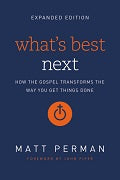1. Do what’s before you with excellence. When you don’t know what your goals are or what your vision in life is, the last thing you should do is nothing.
Instead, do what’s before you with excellence. That is often the path to identifying what you should be doing, or at least opening up opportunities that will help you find greater clarity.
Related to this is doing what you most enjoy as well. You might say, “That’s the problem; I don’t know what I want to do.” And, of course, you might not know on a macro scale. But you do know which activities are most enjoyable to you. As long as those are things that make a contribution, keep doing those (or start doing them) and see where it takes you.
As part of this, be willing to move forward imperfectly. You learn by trying things and making mistakes. As with everything, so with mistakes: make excellent mistakes. Make mistakes of forward motion, not mistakes of sloth. Try things, be bold, and see what happens.
2. Take steps for fundamental reasons, not instrumental reasons. Doing something for fundamental reasons means doing something because you love it in itself. Doing something for instrumental reasons means you are doing it because of where it might lead, even though you don’t necessarily enjoy it in itself.
Don’t take a step you are not going to enjoy simply because you think it will open up a door to something you do enjoy. It seldom works this way.
Keep choosing what you enjoy most and are best at, and let that guide your path.
3. Care about who as much as what. When there are several different types of activities you enjoy, pay special attention to what type of people you like to work with and be around. Some of my best decisions are decisions I made because they enabled me to join forces with quality people who love the Lord, whom I respect, and who make me a better person. When you aren’t sure what to do, the next best thing is to navigate your course on account of who you want to be with.
Notice that my point here is not to follow the crowd or seek the approval of others. I’m talking about being integrated with people who make you a better person, not seeking popularity or trying to feel good about yourself. “Whoever walks with the wise becomes wise, but the companion of fools will suffer harm” (Prov. 13:20).
4. Increase your opportunity stream. Learn, network, and do things. The more you do these things, the more you increase your opportunity stream. And to make this work, you have to be open to surprise. Put yourself in the path of surprise and unplanned opportunities, and then seize them.
5. Read inspiring books and biographies, and watch inspiring movies. Developing your vision is just as much a right-brain, creative, imaginative activity as it is a left-brain activity. To help tap into this, read biographies and books that encourage you to do hard things and dream big dreams for God and the good of the world. This is also one of the overlooked benefits of watching movies. We can find inspiration in the visual presentation of stories with a hero who overcomes massive obstacles for the sake of a great cause.
6. Stay faithful in prayer! Don’t just try to figure things out on your own. As with all planning, involve God and make him the center (Prov. 16:3). You are not the captain of your ship. God determines what happens to you and where your ship goes, and he is a good God who looks out for you and is eager to make your life count for his glory and his people’s good. This is always true, but if you take it for granted by not involving him in thinking through your plans and pleading with him in prayer, the course you are on will suffer: “You do not have, because you do not ask” (James 4:2).
7. Take action and commit. Get involved in the world of work, get a job that is challenging and calls on the best of you, and live your life. Don’t be aimless, even while seeking to discover your chief aim in life. Do something. Not something to bide the time, but something meaningful, and you will discover your life goal on that course.
— Matt Perman, adapted from the new expanded edition of What’s Best Next: How the Gospel Transforms the Way You Get Things Done, now in softcover.
How to Use This Book
Productivity isn’t just about getting more things done; it’s about getting the right things done. Matt Perman’s What’s Best Next will help you identify and accomplish the things that make a difference. Theologian Wayne Grudem says What’s Best Next is “A refreshing, lively, remarkably insightful, deeply God-centered approach to productivity. I kept taking notes about ideas that I wanted to implement in my own life.”

